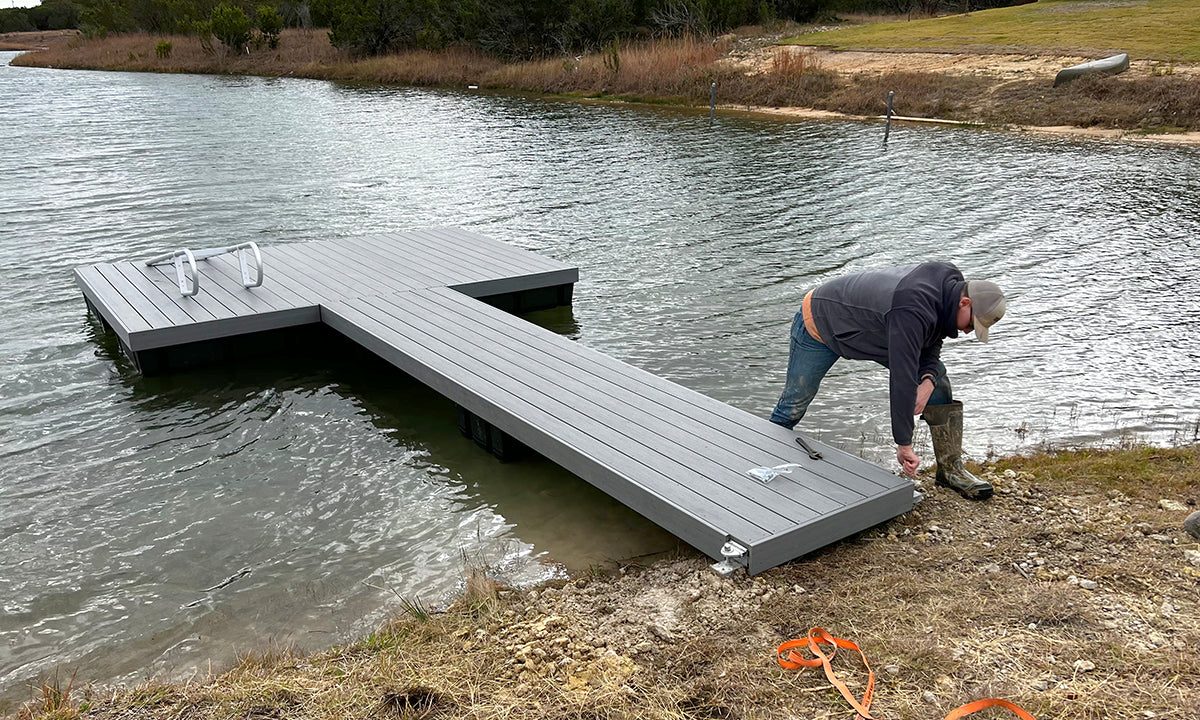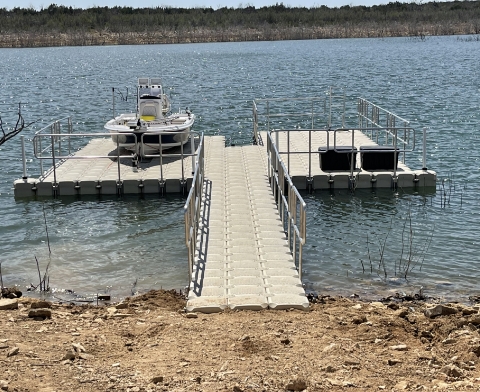Improve Your Water Experience with Customized Floating Docks Designed for Your Way of life
Improve Your Water Experience with Customized Floating Docks Designed for Your Way of life
Blog Article
The Ultimate Overview to Selecting the very best Floating Docks
Choosing the excellent floating dock requires an extensive understanding of numerous components that influence both performance and durability. Variables such as dock types, materials, and necessary attributes considerably affect your decision-making process.
Recognizing Floating Dock Types
When picking a floating dock, it is vital to comprehend the various kinds readily available, as each offers unique functions and applications. Floating docks mostly come under three classifications: modular, fixed, and pontoon docks.
Modular docks are made up of specific sections that can be easily set up or reconfigured, making them excellent for altering water degrees and varied usages, such as recreational activities or commercial operations. Their adaptability permits customization based on particular requirements.

Pontoon docks are characterized by their resilient structure, frequently made up of multiple pontoons that give stability and assistance. They are especially well-suited for bigger vessels and are frequently used in marinas or for beachfront buildings. Recognizing these types aids in picking one of the most suitable floating dock to satisfy certain requirements, guaranteeing optimal performance and security.
Trick Products for Longevity
Picking the best materials for floating docks dramatically impacts their durability and longevity. One of the most common products consist of wood, plastic, steel, and composite products, each offering distinctive benefits and restrictions.
Wood, commonly favored for its aesthetic appeal, calls for regular maintenance to stand up to moisture and degeneration. Pressure-treated lumber can improve resistance to rot, but it may still be at risk to pests and weathering.

Plastic docks, made of high-density polyethylene (HDPE), are immune to rust, UV radiation, and impact, making them a preferred option for coastal atmospheres. Their lightweight nature additionally assists in easy installation and moving.
Metal docks, usually built from aluminum or galvanized steel, give exceptional toughness and resilience. They are resistant to corrosion, specifically when treated, yet may call for additional insulation to protect against warm accumulation in hot climates.
Composite materials, integrating timber fibers and plastics, provide the benefits of both timber and plastic, resisting dampness and fading while requiring very little upkeep. - floating dock company
Inevitably, the choice of products should line up with ecological conditions, meant usage, and upkeep preferences to ensure the floating dock remains useful and visually pleasing in time.
Important Features to Take Into Consideration
While the choice of products is essential, thinking about important attributes for floating docks is equally important to make sure ideal performance and user satisfaction. One key function to evaluate is the dock's buoyancy capability, which figures out exactly how much weight it can support without submerging. dock company. This is crucial for accommodating watercrafts, personal boat, and even leisure activities
Furthermore, transportability is a significant factor to consider. Depending on your needs, you may desire a dock that is very easy to deliver and disassemble, especially if you intend to transfer it look at this website seasonally. Stability is one more essential function; a well-designed floating dock needs to lessen motion triggered by wind and water currents, providing a secure system for individuals.
Safety and security functions, such as non-slip surface areas and rounded sides, are likewise critical to stop crashes, particularly in damp problems. In addition, take into consideration the news accessibility of accessories, such as bumpers, ladders, and cleats, which can improve the performance of your dock.
Installment and Maintenance Tips
Establishing and maintaining a drifting dock needs careful preparation and interest to detail to guarantee its long life and ideal performance. Begin by selecting a suitable area that minimizes exposure to strong currents and waves, which can create wear and tear. Ensure that the water deepness is sufficient for the dock's elevation and that it is secured securely to protect against motion.
During installment, comply with the producer's standards carefully, as improper setting up can jeopardize security. Use high-quality materials immune to corrosion, such as light weight aluminum or treated wood, to boost longevity. Consistently inspect all elements, including drifts, connectors, and anchoring systems, for indicators of damage or wear.
If your dock uses flotation protection devices, ensure they stay undamaged and complimentary from punctures. By sticking to these installation and maintenance tips, you can take pleasure in a trusted and functional floating dock for years you can find out more to come.
Budgeting for Your Dock
Budgeting for your dock is a crucial step that can dramatically influence your general fulfillment and investment in a waterfront residential or commercial property. Establishing a clear spending plan assists you navigate the numerous choices available and guarantees you make notified decisions that straighten with your monetary capabilities.
Begin by establishing the size and design of the dock you call for, as these elements will greatly affect the expense. Floating docks can vary significantly in rate, depending on materials, buoyancy, and attributes like ramps and devices. Study different manufacturers and providers to contrast rates and comprehend the marketplace value.
Along with preliminary costs, think about ongoing costs such as upkeep, insurance coverage, and potential repair services. Allocate funds for these persisting costs to prevent shocks down the line. It's likewise sensible to budget for any type of necessary licenses or examinations, which may be called for by local guidelines.
Lastly, remember the possible return on investment. A well-planned dock can boost your property's value and charm, providing a positive economic impact in the long-term. By budgeting effectively, you can make sure that your dock meets your needs without jeopardizing your monetary security.
Final Thought
In verdict, choosing the perfect floating dock requires a complete evaluation of different variables, including dock kinds, materials, necessary functions, and installation procedures. Cautious consideration of monetary constraints will certainly further make certain a sound financial investment.

While the choice of materials is vital, considering necessary functions for floating docks is just as important to guarantee ideal performance and customer satisfaction.Establishing up and keeping a drifting dock requires careful planning and attention to information to guarantee its long life and optimum efficiency. Floating docks can vary substantially in cost, depending on products, buoyancy, and functions like ramps and devices.In final thought, choosing the suitable floating dock requires a complete examination of different aspects, including dock types, materials, essential features, and installment procedures.
Report this page